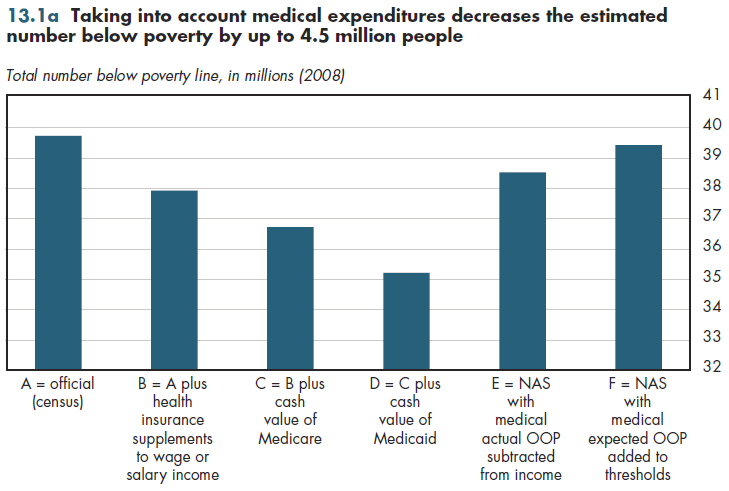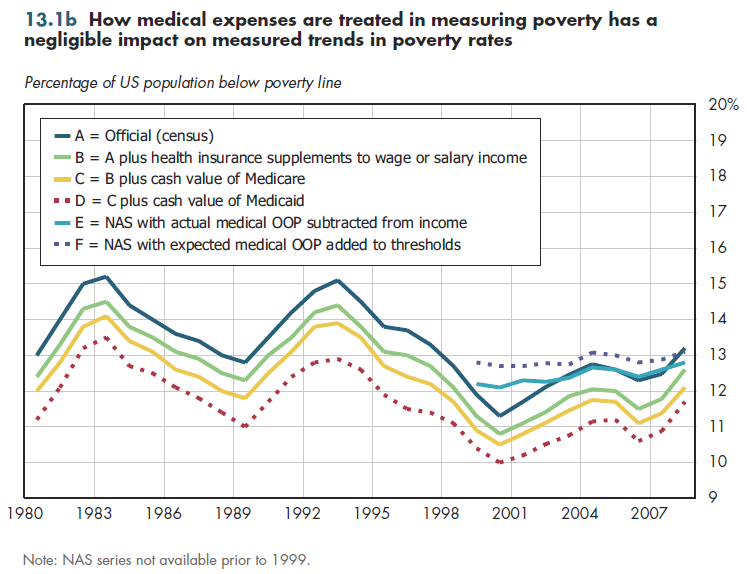Download PowerPoint versions of both figures.
Inside Collection (Textbook): American Health Economy Illustrated
13.1 Millions Are Categorized as Poor because Medical Expenditures Are Not Taken into Account
Summary: Millions of people no longer would be categorized as poor if medical expenditures were handled differently when measuring poverty.
The term poverty not only implies having less income than someone else in similar circumstances or less income than one would like, but it means an economic condition of sufficient concern to elicit sympathy from others, and possibly to raise the question of social action to correct it. No single definition is possible. Whether one falls below this threshold varies by country, historical epoch, and even among citizens of the same country at a single time.
Scientists or economists cannot define poverty. They can describe only whatever definition is being measured. Others would have to decide whether that measure conforms to what they have in mind when they think of poverty. Figures 13.1a and 13.1b show the percentage of the U.S. population living below poverty according to various definitions. These data do not encompass the full range of possibilities. They highlight how measured poverty rates depend on the alternative manner in which experts have suggested medical expenses should be treated. These definitions include:
- A. The official standard—cash income below the official threshold of three times the cost of minimum food needs in 1963, adjusted by changes in the consumer price index
- B. Similar to A, but adding the value of health insurance supplements
- C. Similar to B, but adding the cash value of Medicare benefits
- D. Similar to C, but adding the cash value of Medicaid benefits
- E. One standard recommended by the National Academy of Sciences (NAS) in which a family's actual medical out-of-pocket (OOP) expenses, inclusive of health insurance premiums, are subtracted from income (compared with a poverty threshold that excludes medical spending). Note that the NAS method differs from the official standard in other respects.
- F. An alternative standard recommended by NAS in which expected medical out-of-pocket costs are added to the poverty thresholds


Using definition D reduces measured poverty by approximately one-ninth. This is a modest relative change, but it would reduce the estimated number of poor in the United States by approximately 4.5 million in 2008 (figure 13.1a). However, how medical expenses are treated in the definition of poverty has only a negligible impact on measured trends in poverty rates (figure 13.1b).
Downloads
References
- Department of Commerce. Bureau of the Census.
Collection Navigation
- « Previous module in collection 12.7 Regional Differences in Health Spending Burden Have Narrowed then Increased
- Collection home: American Health Economy Illustrated
- Next module in collection » 13.2 Government Insurance Covers Half of the Poor
Content actions
Give feedback:
Download:
Add:
Reuse / Edit:
Twin Cities Campus:
- © 2012 Regents of the University of Minnesota. All rights reserved.
- The University of Minnesota is an equal opportunity educator and employer. Privacy
- Last modified on Sep 26, 2013 1:30 pm -0500









